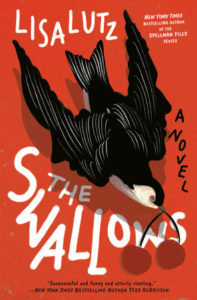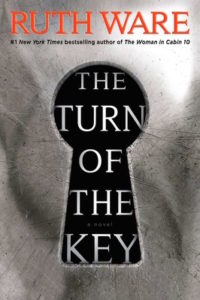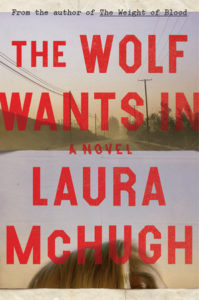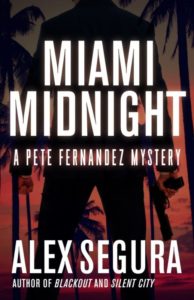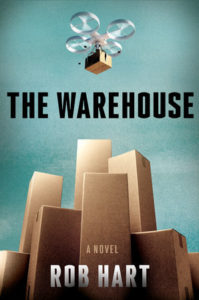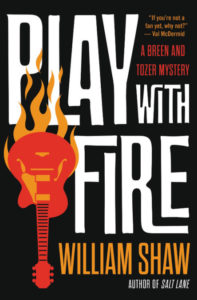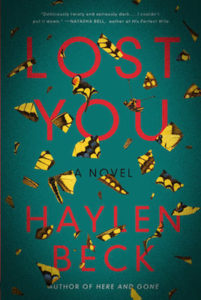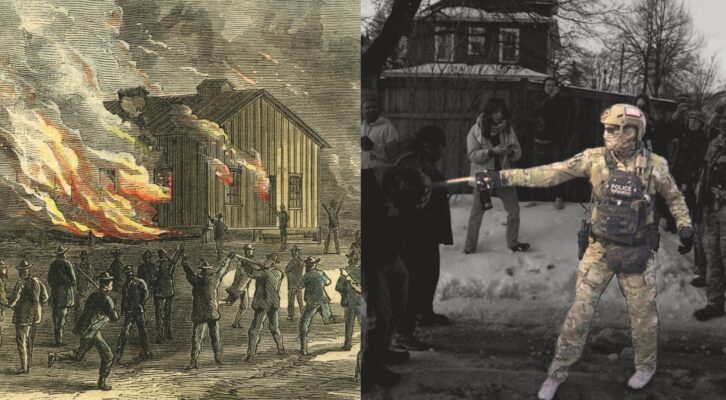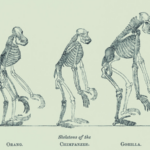At the start of every month, CrimeReads staff members look over all the great crime novels, thrillers, and mysteries coming out in the weeks ahead and make recommendations based on what they’re reading and what they can’t wait to read. Check back over the course of the month for more suggestions for feeding your crime habit.
Lisa Lutz, The Swallows (Ballantine)
Liza Lutz is a treasure. Her “Spellman Files” series manages to be both charming and shrewd, and “The Swallows” promises to follow suit—it looks witty and caustic, winsome and clever. It’s also, and this is a classic Lutz move, a fresh, unique spin on a genre that already has been reworked a million times. While “The Spellman Files” twists the rogue-PI archetype and Lutz’s standalone novel “The Passenger” plays with a “woman on the run” plot, “The Swallows” evokes a once popular Victorian detective literary genre—the hybrid of a suspense plot and a “school story” framework. Lutz, searing as ever, productively re-stages this set-up to illuminate how various institutions excuse the oppression or silencing of women and girls. (Olivia Rutigliano, CrimeReads editorial fellow)
Ruth Ware, The Turn of the Key (Scout)
Ware’s latest is more than a subtle homage to Henry James’s chilling The Turn of the Screw. Ware has tools James could have only dreamt about—namely, technology that can track the members of affluent family of a secluded house in the Scottish Highlands has trouble keeping a nanny. Enter Rowan Caine, an experienced childminder running from her past. With the book narrated by Rowan from prison with one of the children dead, her troubles are far from over—though she insists she’s not guilty, her story is full of moments which reflect poorly on the beleaguered nanny. And if she didn’t commit the murder, who did? (Lisa Levy, CrimeReads contributing editor)
Javier Marias, Berta Isla (Knopf)
For my money (and I imagine many others), Marias is among the very best novelists at work today, and his themes and preoccupations are sufficiently noir-adjacent that I feel comfortable including him on a list of the month’s best crime novels, but especially so this month, with Berta Isla, a story steeped in espionage, social upheaval, and private transgressions. A young couple returns to Madrid, the husband is lured into a world of spies, and the usual Marias explorations of language and intimacy ensue. For newcomers to Marias work, Berta Isla is an appropriate starting point and a fine example of the most intricate, emotionally complex noir coming out of Europe today. (Dwyer Murphy, CrimeReads managing editor)
Yoko Ogawa, The Memory Police (Pantheon)
Yoko Ogawa’s thought-provoking tale of a dystopian island where objects—and the memories thereof—continuously disappear is a perfect exercise in metafiction. The Memory Police follows a novelist who subtly resists the various vanishings imposed upon her by her society, even as she outwardly allows the memories of all that has been banned to fade from her consciousness. When her editor is about to be arrested by the eponymous Memory Police, who quietly remove all those from society who prove incapable of forgetting, the novelist takes him into hiding – and soon becomes a target of the Memory Police herself. (Molly Odintz, CrimeReads associate editor)
Alix Nathan, The Warlow Experiment (Doubleday)
What’s better fodder for a psychological mystery than an enlightenment experiment gone horribly awry? Inspired by an era that brought us horrific experimentation in the name of progress, Alix Nathan has written a delicious historical thriller set in the remote Welsh Marches and featuring a mad scientist determined to explore the effects of long-term isolation, and his half-literate, and semi-willing, subject of study, who has agreed to be imprisoned for seven years with no human contact. Plus, there’s a blurb from Hilary Mantel on there, and there’s no better endorsement a historical fiction novel could have! (MO)
Laura McHugh, The Wolf Wants In (Spiegel & Grau)
McHugh is one of the most talented practitioners of rural noir we have, and Wolf takes on the biggest tragedy to hit small-town America in eons: the opioid crisis. As in her previous novels, Arrowwood and The Weight of Blood, family ties weigh heavy in Wolf. In the way of small towns, everyone is related by blood or marriage, and solving a murder consists of unraveling those ties to see who has the most to gain. (LL)
Alex Segura, Miami Midnight (Polis)
Segura’s much loved and acclaimed Pete Fernandez series comes to a close this summer with a new installment that finds Pete living a relatively stable life, running a bookshop in Miami and sleuthing by night. The appearance of a Cuban gangster disrupts the calm, as Pete is charged with investigating the murder of a jazz musician, the disappearance of a woman, and, ultimately, his own past. Miami has never been so vibrant, so full of ghosts, as it is in Miami Midnight, which gives Segura ample room to explore the hidden pockets and stories of his (and his hero’s) hometown. (DM)
Rob Hart, The Warehouse (Crown)
Hart’s dystopian romance slash crime story demonstrates just how sophisticated and subtle a writer he’s become. Now finished with his rollicking Ash McKenna series, Hart imagines a world dominated by a tech company called Cloud, which has basically become the American economy. You can order just about anything from Cloud and have it delivered via drone to your door before you knew you needed it. The thoroughly modern Cloud is a throwback to the old time American companies where you live in the town—or in this case, the compound—where you work. Hart’s story follows several characters: the founder of Cloud, now facing his retirement and death; a corporate spy working as a picker on the warehouse floor; and a reluctant secruty officer tasked with busting the dealers of a drug called oblivion. But the major and most sinister character is the Cloud panopticon, which all of the characters have to negotiate in order to carry out their personal and professional missions. (LL)
William Shaw, Play With Fire (Mullholland)
If someone handed me a book and said, “Here is a very clever procedural set in swinging London in the aftermath of the death of Brian Jones and the free Rolling Stones concert in Hyde Park,” I would put on my Mary Quant miniskirt and snatch it up no question. But it gets even better: Play With Fire is the latest in Shaw’s excellent Breen and Tozer series, about a square, slightly older London DS Cathal Breeen (called Paddy due to his Irish origins) and his hip pregnant girlfriend and former partner Helen Tozer. The two are called not to the Jones murder but to investigate the killing of a prostitute to the rich and famous called Julie Teenager and are still sucked into the dark side of the London party scene. (LL)
Olga Tocarczuk, Drive Your Plow Over the Bones of the Dead (Riverhead)
Published in Poland a decade ago (and already with its own film adaptation), Olga Tokarczuk’s Drive Your Plow Over the Bones of the Dead is a complicated, dark fable with a simple mystery at its center. The protagonist, Janina, a 60-year-old English teacher/William Blake translator/amateur astrologer, learns of the deaths of several local men and begins to search for their murderer. But Janina, a vegetarian and believer in animal rights, believes that animals are behind these killings—a theory which leads her to confront the town’s patriarchal hunting culture. Tokarczuk, who won the Man Booker International prize last year, blends feminism, animal-ethics, non-traditional wisdom, and highbrow literary appreciation in this thoughtful, enlightened, and stirring argument about the connectedness of human and animal lives—and especially how the oppression of animals, the dismissal of women, and an insistence on the superiority of the human, are born from the same dangerous culture. (OR)
Robyn Harding, The Arrangement (Scout)
The arrangement of the title refers to a sugar daddy relationship, where a young, pretty woman enters into a relationship with an older man in order to finance her lifestyle. When one of Natalie’s friends makes the suggestion that she go online and find herself a sugar daddy, Natalie is skeptical until she sees the guidelines outlined on the website: all she needs to do is go on dates and make the man feel young and virile, while she collects a monthly stipend (sex optional). But soon after making an arrangement with finance attorney Gabe art student Natalie finds herself madly in love, even though Gabe has a family he has no intention of leaving. When things sour between them, Nat finds herself in a depressive spiral, and begins to do foolish things like befriend Gabe’s daughter and stalk him and his wife; when a body turns up near Gabe’s apartment the arrangement has officially gone awry. (LL)
Haylen Beck, Lost You (Crown)
Haylen Beck (a pseudonym used by the Irish writer Stuart Neville) has been lately establishing himself as one of the crime world’s most skillful writers of psychological suspense, and Lost You finds him working with even higher stakes. A promising debut author goes on a long-awaited vacation only to have her son wander off, and—most shockingly—to turn up with another woman claiming the child as her own. There’s a nightmare aspect to Beck’s story, and to his prose, that’s impossible to resist, as he unfolds a story that works its way into your psyche and roots out your very worst fears. All that, and Lost You still manages to be an engaging, lively read, one that will do you some good to close out summer. (DM)


